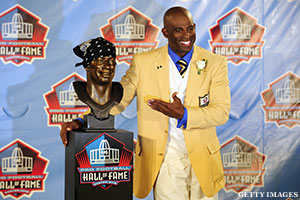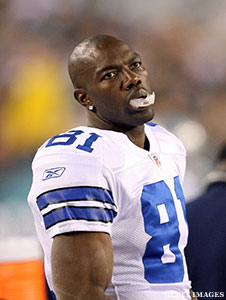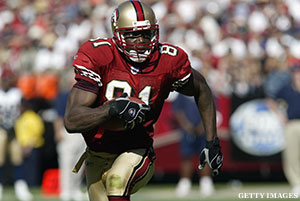
When I was 7 years old, my dad opened his own liquor store in Compton, Calif. Every summer he'd wake me up at 5 a.m. to help him get the day started. Each day began with my sweeping the parking lot. I hated it. Before sunrise, in the dark, the lot seemed endless. But there was nothing else to do and nowhere else to go until we went home at dusk. So after a while I challenged myself to make it perfect. I took the same approach for stocking the shelves and keeping the walk-in freezer clean.
I always think of this when I watch the Hall of Fame ceremony. You know what makes this yearly ritual so compelling? It's because every man who steps to the podium makes a beeline for his childhood. And when he does he takes us all back to where we began. Each one speaks of the values acquired in his youth, about how at the time none of them knew where these values would take them. And this brings all of us to tears.
I was most interested in listening to Deion Sanders last weekend. Maybe it's because I played cornerback. Sanders didn't just play cornerback; it was his position. Sanders discovered something early in life that took me years to figure out: He knew image had greater value than ability. Sanders created an image that was sure to leave an impression. Like he said last weekend, "You either loved it or hated it." The Prime Time persona was genius. Sanders was a pioneer, in a way. Tricky work, pioneering. Most folks don't appreciate your efforts until you're in the dirt.
But some of us have always known what Sanders brought to the game. Before his arrival, most of the dynamic athletes were found at the receiver and running back positions. There were exceptions to the rule -- like Darrell Green, of course. But Deion Sanders did for pass defense what Magic Johnson did for passing the basketball -- he gave a once utilitarian task a certain cache.
Then there was the speed. I remember talking to Merton Hanks shortly after Sanders joined the Forty Niners. "I knew he could run," Hanks told me. "But I didn’t know he could run like that."
To fully comprehend Deion Sanders, you have to play the corner. Among the keys to playing the position are patience and the ability to bait the quarterback. This is usually accomplished while playing zone defense, where a defender can disguise his coverage and fool the quarterback into throwing his way. But rare is the talent who can do this in basic man-to-man.
In Sanders' first year with the Cowboys, they played the Raiders. Sanders was covering Rocket Ismail on a post route. It was a blitz, so Sanders had no deep safety help, meaning there was nothing but open field. Sanders allowed Ismail to get two steps ahead of him. Oh, I should probably remind you that Ismail was nicknamed "Rocket." When he got a step on you, let alone two, the race was over.

By all appearances Ismail was open, so the quarterback threw the ball. This was Sanders' plan. With the ball in the air, Sanders slipped into another gear -- a gear that only he had and that he employed at will. He closed the gap between himself and Ismail. He then hovered over Ismail's back shoulder, and without touching him he reached over Ismail and picked the ball, briefly holding it aloft much like an outfielder would, before proceeding the other way.
He made it look easy, too. But that's not such a good thing. For most of his career, Sanders was a lightning rod as there were few public personalities who invoked stronger reaction. And when a talented, passionate, and confident person makes his craft look easy, it often leads to resentment.
This is where sport diverges from the "real world." The "real world" craves humility. But in these days of simplified logic and extreme points of view, humility is often conflated with self-loathing. Look at Tony Dungy. He's humble. But he likes who he is.
In sport, there's no room for self-loathing. See, in order to function in the world of competitive sport, you must possess an unwavering belief in yourself. Without it, you won't last a day.
Prior to each draft, when an NFL coach or executive sits down with a player and he asks that player why he should draft him, he wants to hear one answer: "Because I'm the best player at my position and drafting me will make your team better." In fact, some coaches will tell you, "Act like you belong."
Deion Sanders belongs in the Hall of Fame. I'm sure most agree with that now. But it's okay to admit that you once hated the man. You hated the bravado, the jewelry, and oh, all that dancing. But as you listened to him speak with genuine emotion, introspection, and reverence about his mother, his career, and his life's journey, you heard something else. You heard a man who, despite his public perception, was humbled by the fruits of his labor.
There's another guy who belongs in Canton. And sometime, perhaps in the near future, he'll step to the podium and speak to us about his journey. His name is Terrell Owens and I'm quite certain you hate his guts. I understand why. The guy has alienated teammates, orchestrated spectacles, and constructed for himself one of the most troubling personas in the recent history of sports.
It's fitting that Terrell Owens followed Jerry Rice. There are similarities. Both came from small, dusty towns in the south. And after wreaking havoc at small schools, both were asked to play in San Francisco, a most affluent place already overrun with mythical figures. And both were temperamental lads whose desire to constantly prove their worth could make them rather explosive.
When Rice arrived in San Francisco, the team had already won two Super Bowls. Joe Montana, Roger Craig, and Ronnie Lott left little room for original personalities. But Rice went to work forging his anyway. In time, he had his own brand of excellence. But by then he was also consumed by it.
I was a teammate of Jerry's when, after not having the ball thrown to him on a scoring drive, he turned over a table of Gatorade and screamed, "I’m not a [expletive] decoy!" If you're around the game, you know this is normal behavior. Of course as he got older, Rice mellowed and those eruptions were eclipsed by the overarching legend.
Terrell Owens was drafted in the shadow of that legend. And in Rice's final year with the Niners, Owens had that game against Chicago where he caught a then league-record 20 passes. After that game, Rice told Owens "It’s your team now." But Owens needed more than just a record setting afternoon and Rice's blessing. Jerry was taking his body to Oakland, but his myth was staying put. Owens had to solidify his own legacy.
Man, was he ever earnest in that pursuit!
After the infamous pose in the middle of Texas Stadium came the humiliation of Jeff Garcia, the alienation of Donovan McNabb, and the contrived reality show.
Times change more than people do. Now, if there's an eruption on the sideline, we'll all see it. And whatever the network cameras miss, the cell phone lens will pick up and disperse to every nasty little nook and cranny of the universe. This is the universe that feeds Terrell Owens. He's no pioneer. He's an opportunist. He knows you're watching him. And he knows that in sport, love is fleeting, but hate is deep and lasting. The villain gets as many hits, shares, and air time as does the hero. Maybe more.

And there's the rub. Terrell Owens' bizarre saga of existential angst begins with a young man who had yet to visit the awful tree of knowledge.
Surely you recall that '99 playoff game between San Francisco and Green Bay. After four crucial dropped passes and a fumble, Owens caught the game-winner while being hit by two defenders. Then he collapsed and broke into tears, briefly crushed beneath the moment.
Steve Young provided all the analysis we needed for that day and every day since. After the game, Owens apologized for the dropped balls and told his quarterback he was afraid Young might not throw his way at crunch time. Young replied, "Are you kidding? You're the most physically dominating receiver I've ever seen."
And that, folks, is pretty much all we need to know about Terrell Owens the athlete.
Everything else -- born to a 17 year-old mother, raised by an alcoholic grandmother, and the discovery that his estranged father had always lived just across the street from him -- will be discussed at a later time.
At least it should be.




